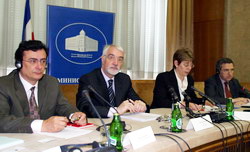- Serbia
Get to know Serbia
- Citizens
Culture and science
Health services
Pension and disability insurance
- Business
Employment
Economy
- Media
- Government
- Contact
Keep in touch
Contact form
Back
Keepin touch
Whether you have a question, comment, suggestion or any problem in the purview of the government, send us your message and we will try to respond as soon as possible. If your problem is not in our purview, we will forward your message to the relevant institution.
Q:
A:
Partnership in the area of agriculture worth €3 million
Belgrade,
31 March 2005
Representatives of the European Commission, the European Agency for Reconstruction, agricultural ministries of Slovenia and the Netherlands, and the Serbian government presented today the new “Twinning Project” aimed at preparing Serbia for European integration in the area of agriculture. The project worth €3 million will be financed by the EU, and will help harmonise the agricultural and legislative systems with those of Europe.
Serbian Deputy Prime Minister Miroljub Labus said that he is convinced that in the following two and a half years results from the programme would be visible, and that the overall effect on agricultural manufacturers and citizens would be positive, as food would be of better quality and cheaper.
Labus underlined that it is important to harmonise regulations with the EU in the area of agriculture as the largest allocation of funds from the European budget to future members are designated for agriculture.
He assessed that Serbia-Montenegro’s accession to the EU is no longer a political ideal, rather a decision accepted both by the previous and current Serbian governments, as well as by the Serbian parliament.
Head of the European Commission Office in Serbia Josep Lloveras said that Serbia can exploit its large agricultural potential, and pointed out that nearly half of the population works in the field of agriculture.
He added that a new form of cooperation between EU members and Serbia-Montenegro would be introduced with the implementation of this partnership project between Slovenia, the Netherlands, and Serbia.
Head of the European Agency for Reconstruction Adriano Martins underlined that during the past seven years the EU has already realised 14 partnership projects in several fields including energy and judiciary.
Among the priorities of this European aid is the improvement of food security policy, stated Martins and added that since 2001, the EU has implemented many projects with a total value of some one billion euros
Marko Verbic, a representative of Slovenia and Ate Oostra, from the Netherlands, assessed that the Serbian government would need the support of the parliament as well as the general support of the economic and political sectors in attaining its European goal.
Serbian Minister of Agriculture, Forestry and Water Management Ivana Dulic-Markovic underlined that the new strategy for agricultural development in Serbia would be adopted in April.
Labus underlined that it is important to harmonise regulations with the EU in the area of agriculture as the largest allocation of funds from the European budget to future members are designated for agriculture.
He assessed that Serbia-Montenegro’s accession to the EU is no longer a political ideal, rather a decision accepted both by the previous and current Serbian governments, as well as by the Serbian parliament.
Head of the European Commission Office in Serbia Josep Lloveras said that Serbia can exploit its large agricultural potential, and pointed out that nearly half of the population works in the field of agriculture.
He added that a new form of cooperation between EU members and Serbia-Montenegro would be introduced with the implementation of this partnership project between Slovenia, the Netherlands, and Serbia.
Head of the European Agency for Reconstruction Adriano Martins underlined that during the past seven years the EU has already realised 14 partnership projects in several fields including energy and judiciary.
Among the priorities of this European aid is the improvement of food security policy, stated Martins and added that since 2001, the EU has implemented many projects with a total value of some one billion euros
Marko Verbic, a representative of Slovenia and Ate Oostra, from the Netherlands, assessed that the Serbian government would need the support of the parliament as well as the general support of the economic and political sectors in attaining its European goal.
Serbian Minister of Agriculture, Forestry and Water Management Ivana Dulic-Markovic underlined that the new strategy for agricultural development in Serbia would be adopted in April.
-
 Belgrade, 26 November 2025
Belgrade, 26 November 2025Serbia-Hungary partnership best example of European cooperation
-
 Belgrade, 22 January 2025
Belgrade, 22 January 2025Egypt one of Serbia’s closest partners on international stage
-
 Belgrade, 9 July 2024
Belgrade, 9 July 2024Support for 104 associations in diaspora that preserve Serbian language, culture
-
 Belgrade, 15 April 2024
Belgrade, 15 April 2024Competition for StarTech grants open until 31 May
-
 Belgrade, 2 October 2023
Belgrade, 2 October 2023Serbia respects Resolution 1244 and will do everything to preserve peace
-
 Belgrade, 13 September 2023
Belgrade, 13 September 2023Day of Serbian Unity to be celebrated outside borders of Serbia, Republika Srpska for the first time
-
 Belgrade, 8 August 2023
Belgrade, 8 August 2023RSD 24.2m in state aid paid out to citizens affected by storm
-
 Belgrade, 17 June 2023
Belgrade, 17 June 2023Belgrade is doing everything to preserve peace in Kosovo and Metohija
-
 Belgrade, 15 June 2023
Belgrade, 15 June 2023Slovenia will continue to support Serbia on its way to EU
-
 Belgrade, 5 May 2023
Belgrade, 5 May 2023Emergency measures, tightening of conditions for possessing weapons

